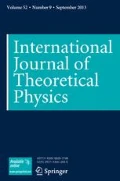Abstract
According to the modal interpretation of quantum mechanics, subsystems of a quantum mechanical system have definite properties, the set of definite properties forming a partial Boolean algebra. It is shown that these partial Boolean algebras have no common extension (as a partial Boolean subalgebra of the properties of the total system) that is embeddable in a Boolean algebra. One has thus either to restrict the rules to preferred subsystems (Healey), or to advocate a shift in metaphysics (Dieks).
Similar content being viewed by others
References
Arntzenius, F. (1990). Kochen's interpretation of quantum mechanics, in Philosophy of Science Association, A. Fine, M. Forbes, and L. Wessels, eds.,Proceedings of the Philosophy of Science Association 1990, East Lansing, Michigan, Vol. 1, pp. 241–249.
Bacciagaluppi, G. (1995). Ph.D. thesis, in preparation.
Bub, J. (1995). Maximal structures of determinate propositions in quantum mechanics,International Journal of Theoretical Physics, this issue.
Clifton, R. (1995a). Independently motivating the Kochen-Dieks modal interpretation of quantum mechanics,British Journal for the Philosophy of Science,46, 33–57.
Clifton, R. (1995b). Why modal interpretations of quantum mechanics must abandon “classical” reasoning about the values of observables,International Journal of Theoretical Physics, this issue.
Dieks, D. (1989). Resolution of the measurement problem through decoherence of the quantum state,Physics Letters A,142, 439–446.
Healey, R. (1989).The Philosophy of Quantum Mechanics: An Interactive Interpretation, Cambridge University Press, Cambridge.
Hooker, C. A., ed. (1975).The Logico-Algebraic Approach to Quantum Mechanics. Volume I: Historical Evolution, Reidel, Dordrecht.
Kochen, S. (1985). A new interpretation of quantum mechanics, inSymposium on the Foundations of Modern Physics, P. Lahti and P. Mittelstaedt, eds., World Scientific, Singapore, pp. 151–169.
Kochen, S., and Specker, E. P. (1967). On the problem of hidden variables in quantum mechanics,Journal of Mathematics and Mechanics,17, 59–87 [Reprinted in Hooker (1975), pp. 293–328].
Specker, E. P. (1960). Die Logik nicht gleichzeitig entscheidbarer Aussagen,Dialectica,14, 239–246 [Transl., The logic of propositions which are not simultaneously decidable, in Hooker (1975), pp. 135–140].
Vermaas, P. E. (1995). Unique Transition Probabilities in the Modal Interpretation, preprint.
Vermaas, P. E., and Dieks, D. (1994). The modal interpretation of quantum mechanics and its generalization to density operators,Foundations of Physics,25, 145–158.
Author information
Authors and Affiliations
Rights and permissions
About this article
Cite this article
Bacciagaluppi, G. Kochen-Specker theorem in the modal interpretation of quantum mechanics. Int J Theor Phys 34, 1205–1216 (1995). https://doi.org/10.1007/BF00676230
Received:
Issue Date:
DOI: https://doi.org/10.1007/BF00676230



